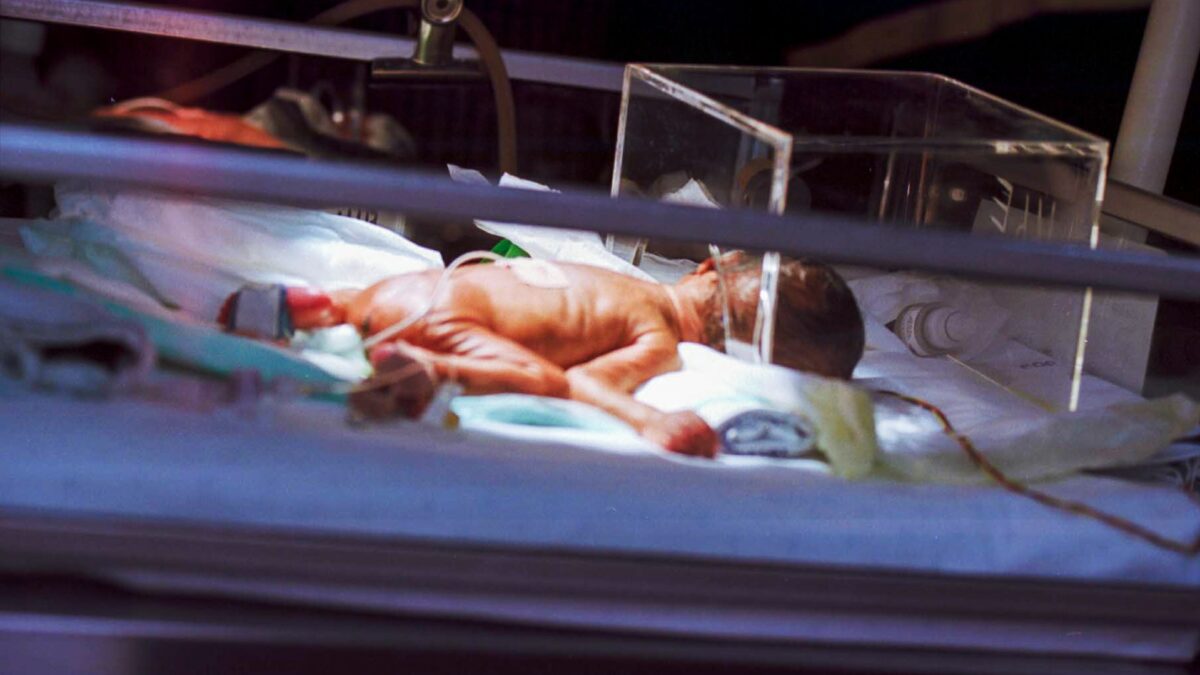
I converted to Roman Catholicism almost a decade ago. At the time, nobody was talking about wars on women, so when I read about Catholic prohibitions on birth control, I naively supposed that most Catholic women actually followed the Church’s teachings on birth control. It’s right there in the Catechism, after all. Reading some books on the subject, I decided there was a lot of merit in this idea about the contraceptive-free life. My husband and I (both Catholic converts) gave it a go.
Imagine how pious I felt when the U.S. Department of Health and Human Services demanded that employers pay for employees’ contraception, and the media clued me in to the fact that I was part of an elite squad. The 2 percent. The Catholic Mom Marine Corps. The Barefoot and Pregnant Dream Team.
Now that everyone is talking about contraceptives, I get lots of chances to out myself as a Catholic freak. Many people are quite amazed to meet a pants-wearing, educated woman who actually favors the contraceptive-free life. I get lots of amusing questions. And it’s National NFP Awareness Week, so an opportune time to talk about chemical-free contraception. Here then, for our readers’ benefit, are the FAQ.
1. Are there really Catholics who take this contraceptive rule seriously? Including ones who can read?
Sure. Among committed and orthodox Catholics, the Church’s teachings on sexual ethics are taken very seriously. Of course, we don’t go around searching one another’s medicine cabinets, but in social circles of serious Catholics I find it’s generally taken for granted that married couples will adhere to this teaching. I know many highly educated and accomplished Catholic women who live contraceptive-free. It’s not just a rule for us. It’s a whole different approach to life and sex and marriage.
Of course, there are also lots of lukewarm Catholics who can’t be bothered about what the Church says. Still others think of themselves as faithful Catholics, but get most of their cues from the popular culture, which convinced them that the whole no-contraceptives rule was effectively dead letter. For a long time the clergy mostly went along with this, and lots of people have told me their priest or deacon told them back in the day that artificial contraceptives were “no big deal.”
Those people have recently gotten a bit of a rude awakening. It didn’t come from Rome. It came from progressive liberals who insisted on pressing the point. People who thought they were (mostly) on the side of the angels were suddenly shocked themselves in bed with Ruth Bader Ginsburg. By picking a fight with the Church, progressives inadvertently taught many Catholics, yes, the Church does still care about contraceptives.
2. Do natural methods of delaying pregnancy really work? Or are contraceptive-free couples liable to end up with 15 kids?
The rationale behind natural fertility methods is fairly straightforward. A man’s fertility tends to stay fairly constant from one day to the next, but a woman is typically fertile for just a few days each month. The trick, then, is to figure out which days those are by observing external physiological signs. That information can be used either to achieve a pregnancy or to delay it.
Does this “work” for everyone? As a practicing Catholic I feel honor-bound to say it can, and I think that’s technically true. Realistically though, some people’s physiology reads like an article in The Federalist (Clear prose! Incisive logic!), and others more like an Egyptian hieroglyph or at least a column in the Huffington Post. If you fit into the former category, natural family planning (NFP) is a wonderful tool, and may well save you from years’ worth of artificial hormones and other unpleasant things. If you’re in the latter set, that’s a tougher row to hoe.
One particular frustration relates to the fact that major physiological events (like pregnancy or childbirth) understandably interrupt the body’s natural rhythms. That makes it especially difficult to judge when you might be fertile. The upshot is that it’s hardest to employ the method at precisely the times you most want it.
As someone firmly in the Egyptian-hieroglyph category, I understand how stressful it can be to be constantly wondering whether you are or might be pregnant. Still, nobody’s physiology is a completely closed book. Pretty much any woman can learn to identify at least occasional periods in which she almost certainly is not fertile. After that, it’s your call how much you want to trust to probability (or, if you prefer, Divine Providence).
Let’s not forget, though, that artificial birth control is also less than 100 percent effective. At least we Catholics know when we’re cracking the door for another possible family addition.
3. Doesn’t it bother you to feel that your Church and Catholic community regard you as a “breeder”?
My Church and community see my natural capacity for fostering new life as a wonderful thing. So no, that doesn’t bother me.
I find that most non-contracepting women have similar feelings. They call the contraceptive-free life “empowering” and “freeing.” It pleases them that their womb is regarded as a feature of their body and not a bug. They like it when their pregnancies occasion celebration rather than criticism.
The term “breeder” implies that a fertile woman should be valued (like livestock) more for her physical capacities than for her virtue or rationality or other human excellences. That is indeed offensive. But of course, nobody actually uses that word except progressive liberals. No conservative friend has ever confused me for my reproductive system.
I understand why some women are afraid that a perpetual proclivity to pregnancy might be used as an excuse to prevent them from pursuing other goals. But some of us (call us dreamers!) think it’s possible to stay committed to personal excellence without suppressing our body’s natural rhythms. We can breed without being “breeders,” just as we can eat without being “eaters” and sleep without being fundamentally dormant. All of the body’s natural capacities can be incorporated into a well-lived life.
I would also note that we “breeders” employ our rational faculties quite a lot in understanding and appreciating our fertility, and in using that information for our own and our family’s benefit. Many other people just try to medicate their natural fertility away. I’m not sure we’re the ones who are slave to our physiology.
4. Do friends and family think you’re crazy?
I imagine some of them do. They’re pretty tactful. When we had two babies 15 months apart, we did get some reactions, and that interval once precipitated a hilarious conversation in which an acquaintance told me how well I was handling my “crisis pregnancy.” Oh, modern world.
Once kids are born and named and flashing adorable grins, most people decide it’s all right for them to stay. I don’t lose any sleep over whether people secretly think my husband and I are weird.
5. Doesn’t it stress your marriage to live contraceptive-free?
Of course. Kids will always stress a marriage. So will practically any other worthwhile project that you and your spouse undertake.
However, it’s also true that living without contraceptives constantly underscores our fundamental belief that our married life has a purpose. We didn’t get hitched just in order to make the world stand around cooing over our shared passion for football, Thai food and philosophy. As we see it, we’ve been commissioned as family-builders and transmitters of human life. All the other joys and sorrows and headaches and heartaches that our shared life brings us must be understood in that context.
Contraceptive-free life has its challenges, but it constantly reminds spouses of their mutual commitment to the project. And couples who do it very rarely call it quits.
6. Are you hoping to end up with 15 kids?
As God wills. But also, no.
7. Don’t you sometimes wonder whether you could do something more interesting with your life, rather than having all these babies?
All right, so nobody ever asks me that point-blank. But it’s sometimes implied in other gently probing questions that people ask, about whether I’m fulfilled, or “really doing what I want” or “adequately using my education”. That sort of thing.
It could be taken as an insult. I’m generally not too bothered. I understand how it might seem like motherhood has taken me off the fast track. Also, I’m not above feeling flattered when people imply that’s where I belong.
However, I don’t feel like I waste very much time. As demanding commitments go, I see the contraceptive-free life as a great value. I’m surprised how rarely people appreciate this. When I reflect on the lives of other people I know, I note how many there are who pour enormous resources into getting degrees they don’t use, or agonizing over that next little promotion, or weathering the heartache of multiple failed relationships as they search relentlessly for their soulmate. What do these people have to show for all their trouble?
I have three healthy children. A happy marriage. A supportive community. Fulfilling outlets as a writer and teacher. I also bake fresh bread, grow lovely tomatoes, and know by name multiple volunteers at our local children’s museum, and I still manage to play Fantasy Football and keep up with the news. Apart from that, I suppose my life is kind of a waste, but I don’t have time to worry about it when dinner’s on the stove and the azaleas need pruning. Check back in 20 years and I’m sure I’ll be more remorseful.
Truthfully, I know that I’m greatly blessed. I couldn’t have such a wonderful life without a supportive husband, family, community, and Church. If people suggest that I’m unusually blessed, I’ll happily concur. Why then do people imply instead that I’m unusually repressed? These are the mysteries.









